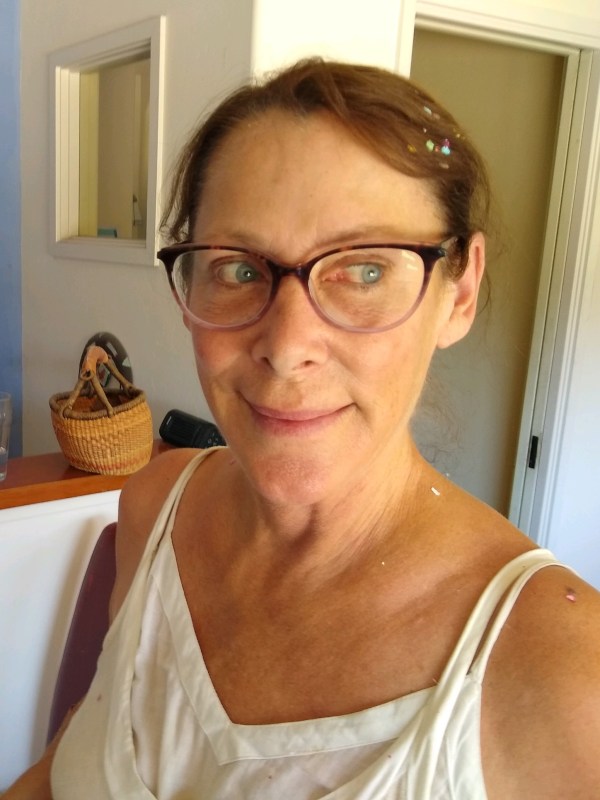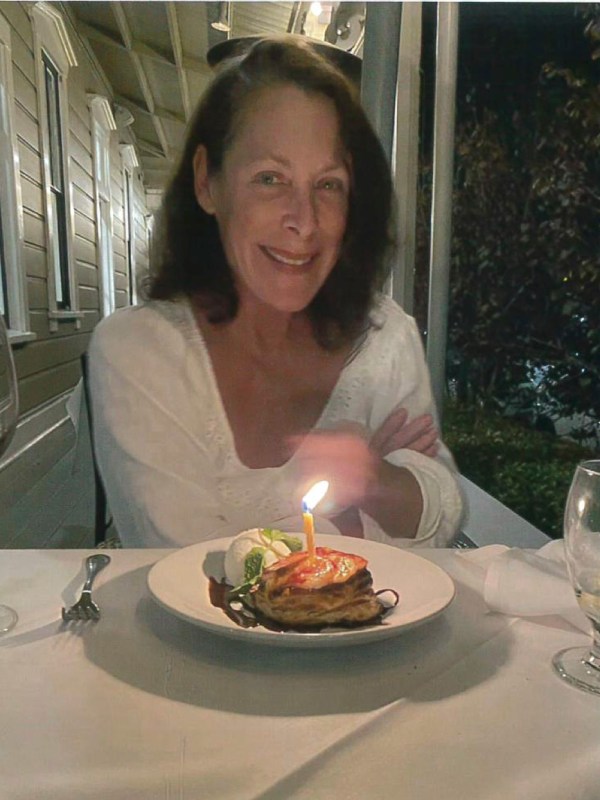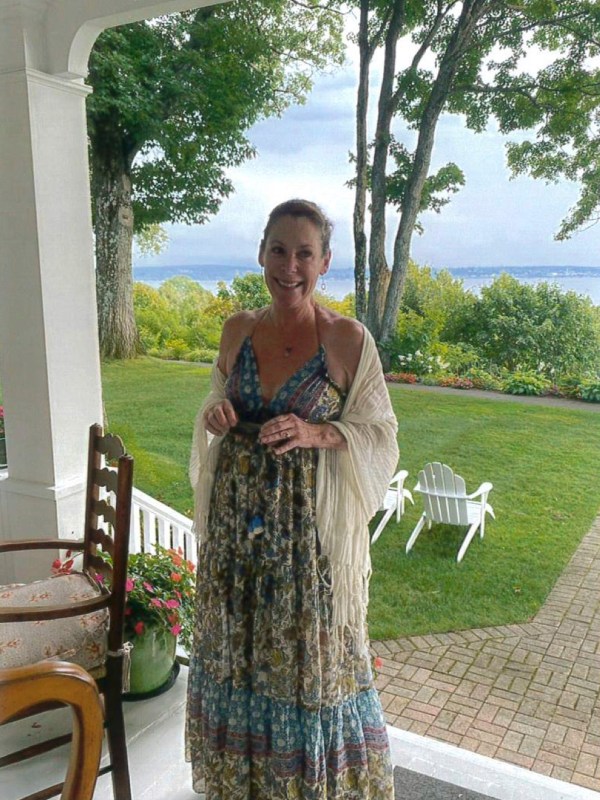Jennie Kearl Welsh
1961 – 2023
For 35 years, Jennie Kearl Welsh and I got to do the dance of life together. Sometimes we were Ginger Rogers and Fred Astaire; other times, we were two porcupines attempting to do the tango. But whatever we were, we were always Jennie and Nick, Nick and Jennie. Sometimes — on special occasions — Jennie would go by Shangri-la Evanescence Duprix. It was a big name, but Jennie was a big spirit. And she was nothing if not evanescent.
Jennie was always about the dance. The night before her demise, we were lucky enough to see Los Lobos burn the house down at the Lobero Theatre together. Los Lobos was one of Jennie’s all-time favorite bands and as usual, they made her cry, they made her punch the sky — more than once — and they had her dancing in the aisles. I was lucky enough to share the dance floor with her.
The day after — on January 23 — Jennie died unexpectedly in her sleep. Like many such deaths, hers came too soon. She had gas left in her tank and places still she wanted to visit, Scotland being her first, second, and third choice.
When Jennie walked down the street, the Red Sea parted. She was a blazing beauty with eyes so blue they never ceased to startle. She was endowed with an equally blazing intelligence. She suffered fools not at all, and was one to take the bull by the horns rather than letting sleeping dogs lie. Things had a habit of getting done when Jennie was involved. But along with all her formidable determination, there was also joy, laughter, and an abundance of sardonic observations.
Jennie delighted in the noisy music of the American language. She especially loved the maniacally original syntax of comedian W.C. Fields. His line from The Bank Dick — “Don’t be a moon-calf; don’t be a jabber-now; don’t be a luddy-duddy” — got frequent repetition in our house. Jennie loved Mark Twain, Kurt Vonnegut and John Muir, the famed Scottish born naturalist, who famously objected to the term “hiking.” People should not “hike,” Muir insisted; they should “saunter” instead. That means to stroll leisurely in a state of prayerful reverie. For Jennie, that sounded about right.
Along the way, Jennie ironically embraced the comically hyper-formalized lingo common to middle managers at the restaurants where she worked in her youth. Somehow, it stuck. She never simply ordered a “Coke,” but always, a “cola beverage.” On the rare occasion that Jennie found herself up against the ropes in an argument, she’d toss out one of her favorite lines from The Big Lebowski; “Yea, well, you know, that’s just like, your opinion, man,” she would say. With that, any argument was instantly over. And being very precise, Jennie knew exactly how many commas were to be enlisted in that recitation and exactly how those pauses should be timed.
Jennie grew up in Orange County, the third of five children; her grandparents — pioneer stock of Mormon faith — learned the importance of ingenuity and self-reliance. Those lessons were passed on. When Jennie was born, she came out tough and certain; but it was also forced upon her. From an early age, she endured way more than her fair share of spit balls, curve balls, and bean balls. When she was 3, her father was in a car crash that inflicted lifelong brain damage. That would be just one of many times where the rug was pulled out from under Jennie. Like many people who radiate an aura of self-possession, Jennie was also too sensitive for her own good. Within her immediate family, Jennie tended to see herself as the rebellious black sheep. In reality, she was a sheep in wolf’s clothing, a big sweetie who was a little too quick to put-up her dukes. Even while partying with friends and carrying on, Jennie would frequently call her mother, Barbra Kearl, to make sure her mom was OK. Later when Jennie’s parents could no longer care for themselves in Utah, Jennie moved heaven and earth to have them moved to Santa Barbara so they could be cared for here.
Jennie moved to Santa Barbara in 1982 to attend UCSB, paying her own freight as she went. As a student, she worked at a halfway house for people recently released from prison, at a flower stand, and at numerous restaurants. Later, she would sell ads at the Independent newspaper which was where, and how, we met. She did many things during her life in Santa Barbara. Most important to who she was and who she intended to be, Jennie worked as a mediator. Working as part of the court’s alternative resolution program, Jennie handled countless landlord-tenant disputes over the years, many messy small claims cases, and many even messier divorces. Mediation, she believed, offered people a rare opportunity to negotiate an outcome acceptable to both sides without incurring the human and financial cost of scorched earth litigation. Over the past five years, she also worked to help find seniors — and their families — the right place where they could get the right level of care for their twilight years. Before that, she’d worked as a paralegal for a number of law firms in town. Wherever she worked, Jennie brought to bear an authoritative mix of compassion and competence. No one fell through the cracks. People knew they were cared for. They were.
Jennie wanted to be a lawyer. Not to be an attorney, but to be a mediator. She studied for the bar as part of a home study effort. She was one of the few people in the state to get clearance to pursue this isolated and challenging route. This, to put it in perspective, is akin to climbing Mt. Everest wearing nothing but sneakers on your feet but with no laces or socks. She came within striking distance three times. The last year she tried, the state bar changed how it calculated the scores. Law schools throughout the state howled in protest on behalf of students who found themselves short-changed. No one howled in protest for people like Jennie. But the goal posts had most definitely been moved. It was a betrayal Jennie never got entirely over. Even so, she still pursued her mediation practice and used her grasp of the law to the advantage of her clients.
Jennie was pretty much an artist at everything she did. Function and beauty were forever enmeshed in her engineering aesthetic; in her mind every built or designed thing should embody both. While Jennie never described herself as an artist, no one ever told her she wasn’t, and she proceeded accordingly. She created hand-sewn Halloween costumes for our children Isaac and Annarose, and hand-tailored jackets for herself. She was quick to embark on backyard construction projects worthy of the Army Corps of Engineers, excepting of course, her projects had flair.
For Jennie, being a mother was everything. As a mother, she gloried in her children’s independent spirits and their wild hearts. She also worried a lot. Her love was always something fierce. To the very end, she remained very much an unrepentant mama bear
Jennie had a gift for noticing things that were not there but should have been. On road trips, she would wonder why the number of bugs splattering our windshield, for example, had dropped so markedly from previous years. Sure enough, we later discovered, this turned out to be a thing, reflecting a significant decline in the world wide insect ecosystem.
Jennie loved music — Iggy Pop made her heart grin and Roy Orbison made her weep. It was how we came together in the first place and it kept us that way for the long haul. She made a point never to learn how to play an instrument. All that focus on technique, she’d say, would interfere with the magic of the experience. Even so, Jennie was endowed with amazingly gifted ears; she had an astonishing recall for lyrics and knew exactly what the melody line was supposed to sound like in any given song.
Most of all, Jennie believed in kindness — ferociously if warranted, and even on occasion when not. Just as much, she believed in justice. The unkind and the unjust were often one-and-the-same in Jennie’s world view and she abided neither. With her, such transgressions could not be sloughed off like water off a duck’s ass. It wasn’t that she wouldn’t; it’s that she couldn’t. In later years, the growing gap between her own moral expectations and the ways of the world would take a toll.
As a woman coming of age at her particular time of history, these issues were neither ephemeral or abstract. They were in Jennie’s face — up close and way too personal — too much of the time.
She loved animals—the wild, crazy sheep from Scotland especially so, but goats, pigs, crows, and roosters, too. Dogs and cats, of course. Horses she loved but they made her nervous. If she saw a lost dog, an unsupervised baby crow, or even a baby rat abandoned by its mother, she had to take immediate action.
Likewise, if she saw a homeless person in distress, she could not rest until something was done to help. She was the calvary that other people called for. The only thing missing, it sometimes seemed, were the horses and bugles.
Ideologically, Jennie was drawn to Christopher Hedges and his astringently apocalyptic critiques of the inequities. She was also drawn to the equally apocalyptic Hopi Prophesies. But when it came to political figures, she gravitated towards the softies. One of her favorites was former President Jimmy Carter. To Jennie, Carter was as close to Mr. Rogers as any White House occupant ever got. And she absolutely loved Mr. Rogers, who famously passed along his mother’s exhortation to always look for where the helpers are. It should also be acknowledged Jennie had an abiding crush on Franklin Delano Roosevelt — transformed by his personal suffering to become a transformational world leader — not to mention Adam Schiff. Jennie was forever expressing gratitude that Dwight Eisenhower — former military commander during World War II — alerted the world to the dangers posed by the “military-industrial complex” on his way out the White House.
For much of her life, Jennie started the day reading the Los Angeles Times. She loved columnists Mary McNamara and Mark Sved in particular. But as the news has grown increasingly grim, not even the intelligent illuminations of McNamara and Sved could save the day. Jennie’s head would shake and the muttering would start. As it built towards a crescendo of exasperation, Jennie would channel her inner Elijah Cummings, the late great Congressmember from Baltimore. “Come on now,” Cummings would rumble, “We’re better than this.” In such moments, Jennie would throw the paper down, look up at the heavens and exclaim — both as curse and blessing — “Come on now… .”
By then, we all knew the punch line.
“We’re better than this.”
Amen, Jennie, Amen.



